The final segment of our series with Bill Black on modern American financial fraud.
Paul Jay
Hi, welcome to theAnalysis.news. Please don’t forget there’s a donate button, and subscribe button, and lots of buttons. We will be back in a second with the concluding episode of The Best Way to Rob a Bank is to Own One with Bill Black. This is the final episode of my series with Bill Black and also kicks off of a film that Bill was part of called The Con and the film is a pretty good explanation of what led up to the 2007 and 2008 financial crash. Here’s another clip from the film.
MOVIE EXCERPT
“I mean it was just 2008/2010 where there were entire streets that had foreclosure signs.”
“You had millions of people asking for help on their loans, to companies who had no interest in helping them.”
“We were being lied to. Citi mortgage employees continually lied to us over the phone. When I asked them specific questions, they would never answer the questions.”
“My husband had a spinal cord injury rendering him paralyzed. So, Wells Fargo offered us a loan modification. They didn’t return phone calls. They provided me misinformation. People were being paid to lie to us, paid to disappear and they never had any intention of helping us.”
“Several employees from Bank of America were given Target and Bestbuy Giftcards for foreclosing on homeowners.”
“These were just document bills, who would just sign any piece of paper that was necessary in order to convince the Judge to let them take the house.”
“All of the documents, that were signed by these ‘robo-signers’ sit behind me. There was 39, 000 of them and they were all fraudulent. These banks, they were a front. They were a front for a criminal enterprise.”
“Our whole regulatory system was a failure when it came to this issue.”
“The jury was kept from seeing my Aunt’s exculpatory evidence. The evidence that was pro-Barbra, got shut out.”
“I heard from a former Chief Justice, you know that the outcome is dependant upon where the Judge believes he’s been in the revenues stream. Who does him the biggest financial favors? So in other words you are saying that they’re bought off.”
“At the time that I was running, I challenged my opponent not to take money from any banks that got government bailout money. I did get a call from Washington telling me to be careful because there were a lot of people who got that money who were in my party.”
“Where people can get away with stuff, they will. The best place to get away with stuff is to have a big corporation that’s traded on the stock exchange, that gives a lot of money to lobbyists and politicians and makes it so complicated that nobody can ever figure out what the fuck you did. And you win.”
“If there is an alarm to be sounded in the aftermath of 2008 it is when you have too much wealth and too few hands, the rule of law begins to collapse.”
“All the Americans who are still out of work, got low wages, huge student debts, underwater homes — all these problems are a direct result of the financial crash.”
“The failure to rescue the American working and middle-class in the great recessions, that has sent us on the trajectory to where we find ourselves today.”
“This is a fight between Main Street and Wall Street. Between big banks and real people.”
“I’m not supposed to win. A borrower is not supposed to win.”
“That is this game, is if you got the money you can make the law or buy the law.”
“No individual has faced any accountability for any of this.”
“I have a new definition for the perfect crime. The perfect crime is the crime that involves everybody.”
“Do you know what the American people would do if those leaders of those banks were indited? It would send a message loud and clear that the games over. And we left them off the hook. We left them off the hook.”
“The only way it’s going to change is the same way it was effected. Which were millions of people have finally fucking had it.”
Paul Jay
Now, joining us, one more time, to discuss the current state of what he calls control fraud is Bill Black. He is an American lawyer, academic, author, former bank regulator, and author of the book, The Best Way to Rob a Bank is to Own One. He’s also an associate professor of economics and law at the University of Missouri, Kansas City.
Thanks for joining us again, Bill.
Bill Black
Thank you. By the way, the docu-series, The Con, is by far, analytically the best treatment. In fact, it’s the only serious treatment of the great financial crisis that exists.
Paul Jay
Great and we’ll put a link to it somewhere above the transcript so it’s easy for people to find. Let me just say one more time, it’s probably best to go back and watch part one and work your way through the history. All the parts work on their own, but they work a little better in context.
So, Bill, bring us up to date. We’ve talked about the history of how people that ran big mortgage companies, big banks, even some of the biggest investment banks, didn’t mind not just taking advantage of their customers, not just taking advantage of their financial clients, but actually looting the banks themselves and if you want to hear that story in more detail in terms of how we got here, as I say, go watch the previous parts but let’s — where are we now? Does the Biden administration look any more serious about going after financial fraud than the Obama administration?
Now, as I say, we are going to compare it to the Obama administration, because comparing regulation, laws, and accountability under the Trump administration is like comparing Biden to Trump on climate, which is comparing it virtually to zero, but compared to the Obama administration and to compare with what’s actually needed, does Biden appear either through his appointments, any actual legislative proposals, or executive orders, is he getting any more serious about this?
Bill Black
The way you framed it, is itself, an interesting analytical question, because, people like, Trump, and Trump is far from alone on this, they’re not zero, they are deeply negative and indeed that is the key concept that there are these things we call criminogenic environment. A criminogenic environment, just like a pathogenic environment, is one where the disease becomes epidemic. In this context, because the incentives are so perverse and because the people in charge embrace what we call the three D’s, deregulation, de-supervision, decriminalization, and of course, it’s really simple, when are you going to get a lot of elite fraud, when you can steal a huge amount with almost total impunity. So, what’s the difference that we’ve seen, especially for those that have actually watched one through eight?
After the savings and loan crisis, a huge percentage of the most elite frauds had one thing in common, and that was a felony conviction and that meant that, to my knowledge, not a single one of them that was convicted reappears in any subsequent financial scandal, certainly not at any national level.
Now, out of the great financial crisis, the catastrophe, that the Obama administration brings us is, much more prestigious, much wealthier people, than in the savings and loan debacle, now have total expertise in how to loot a company and all of them have one thing in common, and that is that there are not only no criminal convictions but there are no criminal prosecutions. They were never even arrested. They don’t even have an arrest record but they have all the knowledge of how to do this next time, unless some have died, obviously 12 plus years, but virtually all of them are still in the age that they can come back as CEOs and do this again, except they’ll hit the ground, not just running, but sprinting. They’ll be up to world-class sprint levels when they start and again, we’ve been trying to explain this whole thing about exponential growth.
These frauds typically grow 50% a year or more, so you go from, for example, Ameriquest, roughly a billion dollars, around 1994, and then you look forward to 2006 and there are 750 billion dollars and they’re the largest purveyor of frauds. So, if we allow those people to hit the ground sprinting, we will have far less reaction time before we’re already in the hockey stick, super-fast rise, and that means that the next disasters could come upon us much more quickly.
So, Obama, proved the leadership thing, right? If you appoint people to the key positions who do not believe, that would make it their mission, not to prosecute, not to even arrest, not to even criticize the looters. Failure is certain.
Paul Jay
Well, it depends on how you define failure. You could say, that he was quite successful with —
Bill Black
From a societal perspective.
Paul Jay
I know.
Bill Black
I have this weird thing, I think, from societies perspective,—
Paul Jay
Because if you’re working for Wall Street, it was quite successful.
Bill Black
It was a well done, mission accomplished type of thing, but our motifs, we had two models. One was, never be the ones chasing mice while lions roam the campsite and Obama, chased only mice and then they would hold up a mouse by the tail and say, look what we did, we’d have to go what the, total failure and all this. The second one was, it’s not necessary to hope to persevere.
So, we were always up against absolutely impossible odds and that’s the second great sin of the Obama administration. They were poised to succeed. They didn’t have to reinvent anything. They had the most successful system of prosecuting elite white-collar criminals, in the history of the world. All they had to do was replicate it. The same people were available to replicate it.
So, if they had forgotten how to use a bike, people say, hi, this is a bike. Here’s how you do it and we can train our kids to ride a bike with it, in about three hours. These are intelligent people. They can be taught how to do these things. So, they had to, not only, not act, they had to create this phony, thing that they were helping America by not prosecuting. That the grave danger was to prosecute the criminals because that would supposedly endanger our financial system, not just at the top.
Paul Jay
Well, is there any truth to it that the situation was so precarious, so fragile?
Bill Black
Well, the last thing you want in a fragile, precarious situation is to have criminals at the top.
You can’t even say it out loud without going, this is insane — if again your goal was to succeed. If your goal is to fail, then it makes perfect sense because — and we’re seeing this with the Trump administration. What happens when you start lying? Then, it spreads new lies and as you try to defend what you’re doing, you have to lie. This is a critical area of the Obama administration, where everything was a lie from the top and it had to be because it was absolutely indefensible. They knew how to do better.
So, that’s the good news. We know how to identify these frauds early, we know how to react. What’s changed? Well, I told you the very first thing, that the first Bush administration — so this is back in ’88 and ’89, the very first thing they did was to get rid of the independent regulatory agency so they could never have an Ed Gray again, that would actually do his job. That if they ever got somebody who had a road to Damascus experience like Ed Gray, left the reservation, and started actually enforcing the law, they just get rid of it and they can do that, under the system where the federal regulatory agencies are now, subservient to Treasury.
So, structurally, we could bring back independent regulatory agencies, if you wanted to be more effective. Conversely, the Fed is an independent regulatory agency and unlike everybody else, it gets its own money every year so it’s not subject to ‘power of the purse’ type extortion the way the S.E.C. [Securities and Exchange Commission] and the CFTC [Commodity Futures Training Commission], what our securities and derivatives regulators are.
I talked about the now, 25-year war, in this case by congressional Republicans, to make sure that those agencies can’t succeed and why, Senator Warren, set up the Consumer Financial Protection Bureau within the Federal Reserve, but not subject to the Federal Reserve. So, the Federal Reserve had to fund it but doesn’t get to muck with it. You could use that kind of arrangement, but you could also have a president, especially a democratically elected president, who would actually use the appointment power of the Federal Reserve to put people in who would do the nation’s business as opposed to big bankings business. We talked about —
Paul Jay
Well, isn’t that rather, the key to the whole thing? As long as the Fed is essentially controlled by the people that are involved in control, fraud, or other kinds of stuff that may not be illegal but should be if they’re the dominant force on the Fed, that’s the big problem.
It’s a huge problem but in addition to the problem you’re identifying, a compounding factor is agencies do have cultures and the Fed culture is economists. Left, Right, Center and conventional economists are a disaster on these issues, so a leading one at the Richmond Fed, who is the research director, Kartik Athreya and if anybody wants to know about modern macro, which I’m a critic of, but he wrote a good book, if you’re really interested in the economics, big ideas in macroeconomics, I encourage people to look at it, but here’s what he says, ‘we are so reluctant to second guess the markets, that we never identify a bubble until it blows up in our faces.’ That’s almost word for word quotation.
Well, then, you shouldn’t be a financial regulator and you aren’t a financial regulator. I don’t care what your title is. You are guaranteed to fail by your dogmas. It’s not good enough that we put people in charge that are supposed to prevent things from blowing up, who have a dogma that says, I will never do so. I will always let it blow up in our face, but of course, it’s not blowing up in their face, it’s blowing up in our faces.
So, the Fed has those dual problems, but then, Clinton and Obama exemplify this bizarreness of Democratic politics. In both cases, what they did is reappoint, Fed chairman who are Republicans appointed by Republican presidents, who had screwed up as badly as it is conceivable to screw up as regulators and again, not for good reasons, but for reasons of dogma and everything else. So, they’re going to persist in getting it wrong and —
Paul Jay
Again, just to define, wrong for whom? Because they got it right for some people. They got it right for the people —
Bill Black
You got me.
Paul Jay
They got it right for the people that told Obama to reappoint them.
Bill Black
So, you see one of the problems already. People like me, the team that I worked with, we didn’t — when we said wrong or right, it was understood. It wasn’t for us. It wasn’t for some political party. It was for the people of the United States.
Paul Jay
Yeah, I’m just hammering home a point. Which I know, you know but these are guys are making mistakes, as you’ve said, by design.
Bill Black
That’s largely true, but when you have an ideology that blinds you to the facts, then you do, on top of everything else, make enormous mistakes in the sense of being blindsided because —
Paul Jay
You have Greenspan’s mea culpa. We were wrong.
Bill Black
Well, Greenspan’s mea culpa was an amazing thing coming from an Ayn Rand Acolyte. He said ‘there was a fraud’. Shocked that there’s gambling in this institution. Captain [Louis] Renault, we’re going to have to close down Rik’s in Casablanca, type of thing. Yes, so all of those problems exist. We don’t fix things anymore — to the extent there was a genius in America, for decade after decade, it was that we were pragmatists. We have a problem, we try to fix it. Our fix doesn’t work, we try it another way and we figure out something that mostly works.
Now, of course, when there are huge areas, we don’t — and that can be another whole series but as too many things, we actually fix things, these folks won’t. They will double and triple and they will quadruple down between that combination of blindness, they know that fraud can’t exist, their economics tells them so. So first, that’s criminogenic in itself because it breeds complacency and complacency is super criminogenic. Oh, nothing can go wrong, but then as the facts come in, you systematically exclude them, so and again, remember, Alan Greenspan is twice renewed and reappointed by Bill Clinton.
The facts come in over, Greenspan’s objection, because, there’s a mid-level person just trying to do the right thing and his name is Siddiqui. Nobody’s ever heard of him. Siddiqui is operating the system where Greenspan has forbid them to use the examiners. We got a whole force of federal examiners and they’re the people who always see the problems first because their job is to look at underwriting and loan underwriting is where you always get the earliest and best least ambiguous warnings. One of Greenspan’s colleagues says we need to send the examiners in, there are all these developing problems, plus, in addition to fraud, there’s predation, against minorities. Greenspan refuses, so Siddiqui, just writes a letter, to the big banks and says, hey, guys, by the way, how many of the following types of loans are you making and these are the insane loans, or not so insane, as you’ve been noting, that best facilitate fraud.
Siddiqui gets back these numbers, in 2005 and its — oh, my God, the story had been there, just some crazies in the hinterlands, of the shadow financial sector. Little places with no deposit insurance and yeah, maybe they’re doing some crazy stuff, but so what? They’re not federally insured. They blow themselves up, no big deal.
Again, Ameriquest is 700 billion dollars of pure toxic and predatory loans, by this point, so, the story is insane but, was, oh, the big guys, the people that dress at night in bespoke suits of 2500 bucks, surely, they wouldn’t do these things and Siddiqui just blows this up, by writing them a letter saying, hey, what are the facts, guys? What are you doing in the way of these loans?
So, Siddiqui, of course, goes — and like a good staffer sends the information out. Now, all he’s done is got the facts from the big banks themselves. You didn’t make up any of this stuff, right? There’s a civil war at the Federal Reserve, in which, as he describes in his testimony, it got quite personal. What the hell is personal about data, provided by the banks themselves? As one of the board members testifies, there were board members that didn’t want those results and so they attacked — the most classic thing, in literature — they went to kill the messenger, who was just giving them vital facts they needed. So you’re right, they’re blind, but they’re self-blinded in these things they put on their own horses — then to tunnel their vision down in exactly one road. So, you need different people. You need to have people that actually understand fraud.
Paul Jay
Now, in terms of the structure of the Fed, what needs to be done to get bank — I mean, why should bankers even be on the Fed at all and maybe some retired one that proves they’re no longer a tool of the banks, but what needs to be changed in the law or the structure of the Fed to actually have the Fed as a legitimate independent and able to be a regulatory body?
Bill Black
Remember when I said we used to be pragmatists and if things were broke, we fix them, and then the famous conservative rule has some truth as well, which is, if things ain’t broke and they’re working really well, probably you shouldn’t break them yourself. So, what are those examples? Well, Glass-Steagall! Glass-Steagall had worked brilliantly for 50 years, separating the inherent conflict of combining investment and commercial banking. Commercial banking is lending, investment banking is you take equity positions, ownership positions in companies.
We decided to take something that was working brilliantly and break it. That’s not very pragmatic. Conversely, well, were there things that we did that were wrong and then we fixed them? Well, yeah, that’s exactly what happened in the savings and loan debacle, everybody, knew that regulation was the problem, in that era. Both parties, economists from virtually every stripe you can imagine and we looked at the data like Siddiqui, except, we got it through the autopsy process I described, and we said this, not only is this not working but this is a disaster. We have to change course, we have to change course radically, we have to do it quickly and we have to come out, huge. This is not a little slow thing, there is a catastrophe coming. We have to get in front of it and do the best we can.
Now, we’re all sure this is a rearguard action and you know what happens in rearguard actions to the rearguard, in these circumstances, but, miraculously, it works out. Again, Obama administration and now the question, of course, for the Biden administration. You are in enormously better circumstances. You now don’t have to deal with an independent regulatory agency that might be screwed up because you brought them in. The secretary of the Treasury has oversight over the office of the Comptroller of the Currency and can act directly, in those circumstances.
So, are they going to do it?
Paul Jay
Yeah, are they?
Bill Black
Well, you knew immediately with the Obama administration they weren’t and it wasn’t just the Department of Justice that we’ve been emphasizing, it was the Securities and Exchange Commission. The leadership of the Securities and Exchange Commission is one of those typical American tragedies. Mary Jo White had, in fact, over a decade earlier, been a real prosecutor but — my wife and I go to the annual meetings of law props and folks like that, and I had seen Mary Jo White, giving a talk about the wonders of earnings management, which is basically securities fraud and so when Obama appointed her, I was going, this has to end, in disaster.
Similarly, in the saving — remember the thing about fixing stuff, in the savings and loan debacle, it was absolutely obvious and it was at some — there were 12 federal home loan banks, just like there are 12 Federal Reserve banks or regional banks, same essential model and in that era, the member institutions elected the president.
The person — it was always a guy, who ran the place. Now, that’s insane, right?
Paul Jay
Remember institutions are banks, right?
Bill Black
Well, in this case, savings and loans, back in the era but back to pragmatism. People went, this is nuts. This is an obvious conflict of interest. If you, have your leadership elected by the people you’re supposed to regulate, then you can’t be the regulator. That — it’s not going to work.
Paul Jay
Same thing at the Fed.
Bill Black
Yes, but not, the same problem, yes but therefore, the first federal legislation, way back in 1989, said no more of this crap.
The federal home loan banks took counterparts to the regional Fed’s, shall no longer have any, governmental authority, for examination or supervision. All of that will go to an exclusively federal agency. So, yeah, that’s the point, we supposedly learned that lesson in 1989, but the Federal Reserve banks are still set up with that conflict of interest. Now —
Paul Jay
The banks vote in the leadership of the Fed.
Bill Black
Yeah, there was,—
[crosstalk 00:29:32]
Bill Black
The president, in the Dodd-Frank, but they allowed this fundamental conflict of interest to be at the core of their system. That’s the death of pragmatism, or in this case, the supremacy of power, because why does this continue, the big banks want it to continue, but why do Democratic administrations, allow it to continue? Well, because these are major contributors and they hope always to win them as the leading contributors because after all, that was the key to Senator Obama winning the Democratic nomination, and then one of the keys to him winning the national election.
So, we still have to fix that. That’s obscene. Let me give you another example, Economists’, came in and they had this rare avenue of an opportunity to actually make public policy, which is a weird thing for academics, way back again, this time in 1991 a long time ago and they got something called the Prompt Corrective Action Law, and they made it the centerpiece, of federal regulation, which it remains today, under the promise that under prompt corrective action, because they took away the discretion of the regulators, they would virtually eliminate all bank failures and the few bank failures that happened would be so trivial that there would be no problem ever with the insurance fund.
That’s how they sold this. In fact — and this has been shown repeatedly by conservative economists studies, the cost of resolution, which was supposed to go down to virtually zero, the cost of resolving a failed bank more than doubled, as a result of the passage of this act.
Paul Jay
Okay, so let me, —
Bill Black
They keep that law in effect today and there is no movement to get rid of it.
Paul Jay
Okay, that’s my question. Looking at what the Biden administration has done in terms of appointments, announcements, any executive orders, there does seem to be some revival of the Consumer Protection Bureau. Gary Gensler, who did some good work at the Commodity Futures Exchange, relatively speaking, now has a serious appointment, is there any indication they’re really going to go in a different direction, or is this kind of to appease some of the progressive voices but fundamentally — and let me add something to this question, a lot of comments that have come on the first episode that we’ve published and I have the same questions, is that a lot of what the big financial institutions do that’s bad for the economy is parasitical, speculative gambling, creates conditions for the need for being bailed out and so on. A lot of it’s legal and we’ve been talking about, when you talk about fraud, you’re talking about real laws that should be enforced, broken, and criminal accountability but a lot of what goes on isn’t illegal because Wall Street has so much influence in what’s considered legal and what’s considered illegal, and that — well, let’s start with that because — is that heading in any kind of different direction?
Bill Black
So first, as an important note, we call that predation and predation is a coequal theme of The Con, along with the outright criminal looting as well, particularly because predation in the American context but this is true in the UK, is targeted towards people who are poorer and are minorities and there’s even some hope in this area among economists because George Akerlof and Robert Shiller, both Nobel Prize winners in economics, are now emphasizing the importance of, predation.
There’s also a long history, [Frederic] Bastiat, a super conservative, early French economist. I’ll paraphrase it, but it’s close to word for word “When plunder becomes a way of life, for people in society, they craft laws that permit it and a moral code that glorifies it.”
So, that is what happened and it’s happened in both major parties, and most fundamentally, that’s what we need to overcome and we haven’t talked about it but the Supreme Court and the lower federal judiciary are also huge problems, both parties but Republicans exclusively appoint people who make it vastly harder, to make something criminal that is on the borderline and therefore a judicial interpretation, whether it’s criminal and even if it is criminal, they make it next to impossible in some circumstances to prosecute them. They do this in two areas, one is elite, white-collar crime and the other is elite political corruption and of course, what I’m trying to get across in this series and again, The Con, is these two always worked in tandem.
One of the things about control fraud is you control a seemingly legitimate entity that can make enormous political contributions and lobbying. So, our saying in the savings and loan debacle was the highest return on assets is always a political contribution. They’re very good at these things, and again, the Supreme Court with Citizens United in the United States has opened the doors for massive political corruption of these systems.
Okay, so, Biden? Yes, the Consumer Financial Protection Bureau, remember, Trump didn’t simply eviscerate the agency, he made it into a weapon, to actually assist the fraudsters, so, yes, we — the person who was appointed, there were actually two, it was a weird thing, by Trump were like comic book villains. Transparently awful people who worked every day to make the world worse for poor people. That was their mission and they were virtually open about it.
So, that agency is no longer a force for evil, but under Obama, with the best of intentions and lots of very bright people, it both wasn’t, raw enough. It was all genteel and studies, years and years of dotting I’s and things like that, it just didn’t have the fire in the belly and it didn’t have a sense of, it’s a crisis, we need to act. It doesn’t have to be perfect.
Now, in fairness to them, again, the lower courts are so hostile to the agency and to anything that protects consumers that this new stuff about cost-benefit analysis, it’s a return to the bad old days of what we call substantive due process. In the law biz, this is when the Supreme Court, sat like it was a super-legislature and said, you can’t pass any laws that are contrary to laissez-faire because we will declare them, a violation of due process, which you are taking somebody’s property or liberty interest, the businesspersons, without due process of law.
So, they’re sneaking that back in under this cost-benefit analysis type of garbage. We could spend additional programs if he wants, about how they’re doing it. I realize why, I mean, they were not irrational under Obama in trying to dot all the I’s, but there’s a tension and you just need to be acting much more forcefully and you need to be exposing the problems.
So, what have we not done? What did the Obama administration religiously not do?
The thing that was essential to success, or among the things we’ve now mentioned, a number of things that guaranteed failure, but one of them was, you have to bring the facts to the American people repeatedly in a friendly form for human beings, not for academics, that explains here’s how — it’s in the end, pretty simple. Really rich, powerful people decided to rip you off, here’s how they did it, and get people who can explain those things in English terms, so how do you do that?
We could do that through a bunch of different means. You can do that through congressional hearings. The Pecora hearing is something we talk about all the time in The Con and the fact that there has been no equivalent to the Pecora hearing. Pecora hearings begin in the new deal, in fact, it’s what makes the new deal work, in the financial sector, because you have a skilled prosecutor asking questions of the most elite bankers of the time, and the public, A, understands it’s being shafted and B, it’s enraged, and then you point and you say, here’s what we’re going to do about it and the public comes with you in these circumstances.
You can also do it by bringing, over a thousand successful prosecutions, all of which we put into plain English and again, people like me explaining — literally thousands of hours Paul, with journalists, this is how the fraud worked. This is why it’s a really big deal. Don’t be intimidated by this complexity. Here’s how we can explain it to folks.
So, they didn’t do any of the cases, they religiously never sued the individuals, even when they did finding admissions, which was rare, they would put individual A, institution Y, so that you could never identify anyone who did anything wrong, who was an elite. They did everything possible to make sure the public would not turn, would not understand what had been done to them, who had done it to them, who needed to be held accountable and what do we need to do to fix it so we aren’t meeting when I have no hair explaining, what the hell —
Paul Jay
So, we’re getting kind of near the end, although obviously, we’re going to do more of these conversations later, but let me pose this to you. The way capitalism has developed, the extent of financialization has given such power to the financial sector, to a point where now it’s really the financial sector essentially owns almost everything else, like, the black rocks and the big asset managers and the other big financial. If you look at who owns the shares of everything on the stock exchange, it’s these financial institutional investors.
They have such power and it’s systemically, so critical that, that I have no idea how we get to what I’m about to say, politically, but I don’t think you can regulate these guys anymore. They have such power over Congress. They have such real power in the economy like I think it goes beyond even their ability to give campaign contributions.
It’s that they just are too bloody big and powerful like your president, you’re going to say, I want you to do this and they say, well, F’ you because, we own everything. You’re not telling us what to do, we’re telling you what to do. I don’t see how that gets broken, without getting rid of that too big to fail threat and, without a strategy, the next time these banks are in big trouble and conditions — get prepared for it now — you nationalized, you create public banking as a public utility and you say to these banks, you want to have casino capitalism? Go ahead. We’re not going to stop you, but we’re also not bailing you out when it all blows up in your face but there needs to be, I think, public banking at a scale that you don’t need these guys anymore.
Bill Black
Well, we don’t need these guys, that’s the point. So, my — I’m with you 80 percent of the way through and then I suggest different answers on the last 20 percent. No, we can’t just let them be a shadow financial sector and say, we won’t bail you out because they’ll blow up the friggin world.
Paul Jay
Okay, I’m with you there. All right.
Bill Black
We tried that. That’s the great financial crisis and we went through how it was a whole political thing about, we will not deal with Lehman Brothers, we’ll just let it blow up and prove our bona fides and Ayn Rand will march down, carefully, not in March step or something, if we’re Ayn Rand. I don’t know what you do, in an Ayn Rand match march.
So, there is no reason, to allow and every reason in the world not to allow, banks to get so large, that they have extortionate power. You don’t need it for banking efficiency. In other words, a size, way below to get to that point, we think, has all the banking efficiencies. Plus, if I had to give up a little bit of a banking efficiency, theoretically in a place that was actually massively inefficient, because they’re crooks, because they have all this power, that would be easy, right.? We would go against the banking efficiency in those circumstances, in favor of what you’re talking about.
So, we lie again about everything as a result of this. These banks are called systemically important. They’re not by their own logic, they’re systemically dangerous. That there are, again, ballpark 30 banks in the world, that every day we figuratively roll the dice and see whether one or more of them will blow up and if they do, they will royally F’ up the world economy. Why would we allow that? That’s nuts.
Now, big nationalized banks, well, there’s a long history of that. Look at Brazil, look at Argentina. They perform very badly because politicians take them over and they say, I want to win the next election. Well, we can, use this to make our following friends very wealthy. However, there’s also a very long tradition of postal banks. Which are really democratic institutions, and you could run them as plain vanilla and not allow them to have any investments or make any corporate loans, in these circumstances and you could bring plain vanilla, safe, cheap banking where they weren’t always Ala Wells Fargo, in the U.K., the payment protection insurance scandals in the United Kingdom? Always trying to cross-sell you something you shouldn’t be buying. You could get rid of those, both the fraud danger and the predation danger and you could do it for 70 million Americans or more that could use the postal banks. So, we don’t need no stinking nationalization in that sense, we can provide plain vanilla.
Now, you’re also right, that the hedge funds of today, this is the shadow financial sector and they have extraordinary power over an amazing raft of things that we could spend programs after program on. Why would we want anybody to have that kind of power? Are we gaining efficiency? No, we are harming efficiency when we do that. So, it’s nuts under any economic theory that we have this system and what does it lead to? What’s happened?
Since we adopted this whole — decade after decade, both major parties in America, this deregulation, de-supervision, decriminalization mantra. Starting in the 70s, what’s happened to our productivity, our growth? Now, the conservative economist assured us it would skyrocket, we’d get rid of all that government inefficiency and such. In fact, it’s nosedived and in particular for the median working-class person, in real terms, wages have not improved for what’s approaching 50 years in America.
So, they’re back to pragmatism. We try things, if they fail we’re supposed to stop doing it. We don’t keep hitting ourselves harder with a hammer, but that’s exactly what we’re doing. So, yes, these hedge funds are supposedly getting us emphasis on profitability, but it’s reported profitability in the short-term and this whole series has explained that’s exactly where the con is. How do you inflate reported earnings and, of course, what’s the biggest, most obvious thing? Again, it’s like somebody is screaming cheerleaders or stock buybacks.
What are they doing with the money, though? Remember, the whole theory is that they’re going to invest in productive technology, advancing things, productivity will expand, wages can expand without any inflation. Kumbayah, it’s all great. All hail the perfect market that, in fact, has not been operating this way. Are we steering huge new investments? No, a stock buyback says we got nothing productive to do with our money.
So what could we do? I know, we could boost the stock price because all of our bonuses are based on the stock price and they’re paid often in stock. How could I get the stock price to go up? I know, I could use all this money, instead of for productive purposes, to buy our own stock.
Paul Jay
But, what I’m saying, is you can’t fix that under this kind of ownership system.
Bill Black
I’m saying the same thing!
Paul Jay
So, you’ve got to change the ownership system.
Bill Black
Yes!
Paul Jay
I don’t know if you’re saying break them up so they’re smaller. The same pools of capital, they’re going to own them because who can buy shares?
Bill Black
So, you are — what I’m agreeing with you, is that it’s not enough to break up the giant banks if you allow private equity in the hedge funds to fulfill the same purpose and you shouldn’t be allowing stock buybacks, period,—
Paul Jay
That’s a separate question.
Bill Black
Or any other things. Yes, but it’s sure as hell related. This is a part of the leverage.
Paul Jay
But I’m saying if you don’t, —
Bill Black
If we’re getting to different points.
Paul Jay
Well, I mean I’m not so sure.
Bill Black
I don’t think we are. I think I’m saying well, I know what I’m saying and see whether it’s coming across but what I’m saying is once you deal with a bank problem, your job isn’t done. You’ve got to deal with the private equity and the hedge fund problem and that could be done by size restrictions because people have no clue how huge the hedge funds are and then as your point is, and it’s leveraged through these other companies where they have the dominant or they are certainly in cartel-like levels already, beyond cartel levels now.
Therefore, look for another critical element that we haven’t talked about much and that is, are they going to start taking anti-trust seriously again? Because there was an antitrust revolution under [Robert] Bork, again, dating back to the 1980s, and both major parties bought into this and that has eviscerated everything but cartels. They still enforce anti-cartel laws in the United States to a fair extent but monopolization, they basically abandon it, and in particular, they’ve said, any time two massive entities or more get together, we’re going to almost conclusively presume that they did it for efficiency purposes rather than market power purposes and the old saying about that, of course, is if the law assumes that, then the law is an ass.
Paul Jay
So, here’s where I think, we were diverging and this is a whole other conversation, I think, and maybe I’m going to get someone to join us.
Bill Black
Still more?
Paul Jay
I’m not sure it’s part of this series. It may just be another episode that we talk about this, but here’s my proposition. As I say, it’s a big conversation, so it’s not fair for me to start it and not let you finish it but anyway, I’m all for breaking up the big banks. I’m all for trying to impose regulations for the benefit of society. I don’t believe it’s possible to do anything effectively without breaking the power of these enormous pools of capital that are in very few hands actually. When you look at the concentration of wealth in the billionaire class, it’s incredible how few institutions and even individuals are really controlling this massive wealth.
Bill Black
Right, but I did just call for that.
Paul Jay
No, no, but I’m saying I don’t think you can do any of that, without also and almost decisively building public banking as a public utility on a scale where you can supplant these guys because you do need corporate big flows of cash financing, both domestically and internationally. You need to do big investments and if the Fed wasn’t so controlled by and for the banks, the Fed is the instrument for creating such a public banking facility.
It has to have some kind of democratization that goes with it. I don’t think you can assume that in a modern capitalist country, although I’m not sure we should call the United States that, there are public utilities that aren’t so corrupt. Lots of the advanced capitalist countries have public utilities that actually work fairly well.
Bill Black
So first, the cash flows are nowhere near as large as I think you’re thinking that are required for productive investment. Remember, the problem isn’t that they lack cash. That’s why they’re doing trillions of dollars in stock buybacks. The problem is the incentive structure and we absolutely have to change compensation. Compensation is run by CEOs, for CEOs in a way that massively harms the firms, the shareholders, the workers, the consumers, so, we have to go — we haven’t talked about that very much, but compensation is the most the single most perverse thing.
Paul Jay
We did talk about it early on.
Bill Black
We have some.
Paul Jay
No disagreement there but let me ask you because we’re getting up to about an hour here. Are you in favor of banking as a public utility? Not just postal banking, I’m talking on a bigger scale than that, not just consumer.
Bill Black
Well, if you mean banks that make big commercial loans, no, because they will make big commercial loans to the Koch brothers and that will be your last election.
Paul Jay
Okay, let’s stop there and I’m going to get somebody who’s a big proponent of this to join the conversation, and then we can talk about it because I don’t think the Koch brothers are lacking for investment now under the current situation.
Bill Black
Oh, they could be much bigger.
Paul Jay
Well, you’re saying that if a Trumpian, would control the federal government, then they can manipulate a bank as a public utility to give money to the Koch brothers?
Bill Black
It wouldn’t be a public utility. Using the phrase public utility doesn’t make something, a public utility.
Paul Jay
All right, well, then what would? Okay, next time we do this, that’s going to be the topic.
Bill Black
Great.
Paul Jay
All right. Thanks very much, Bill.
Bill Black
Thank you.
Paul Jay
Thank you, for joining us on theAnalysis.news. Don’t forget the donate button and all the other buttons. Subscribe and join the email list and share.
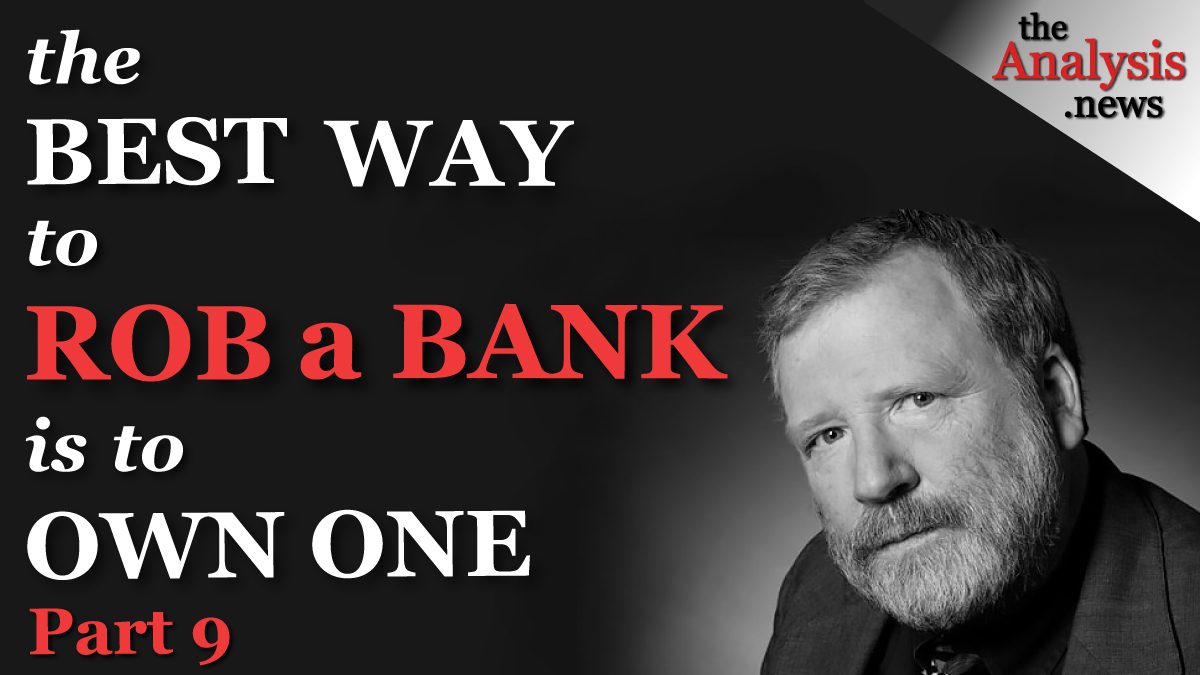
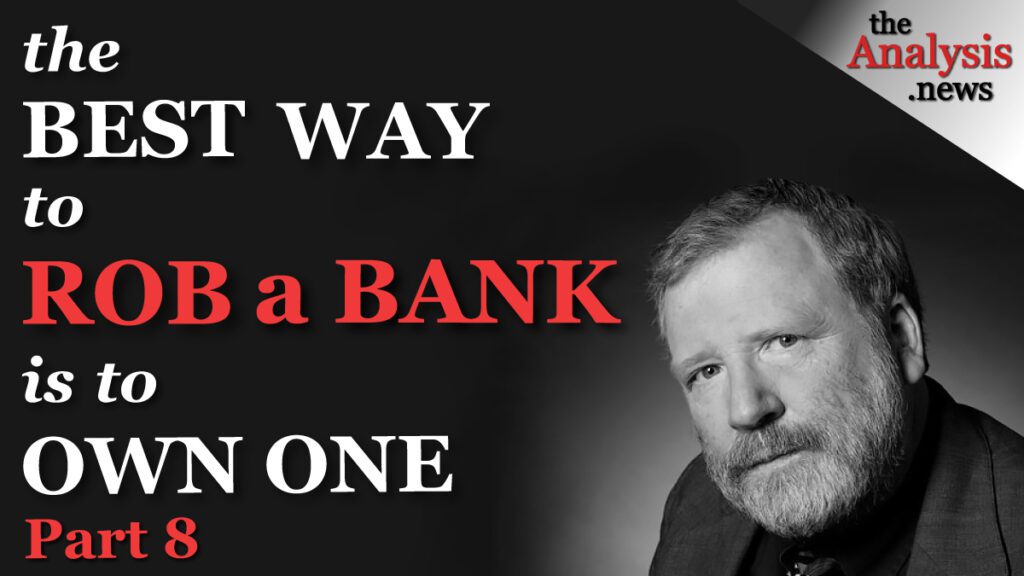
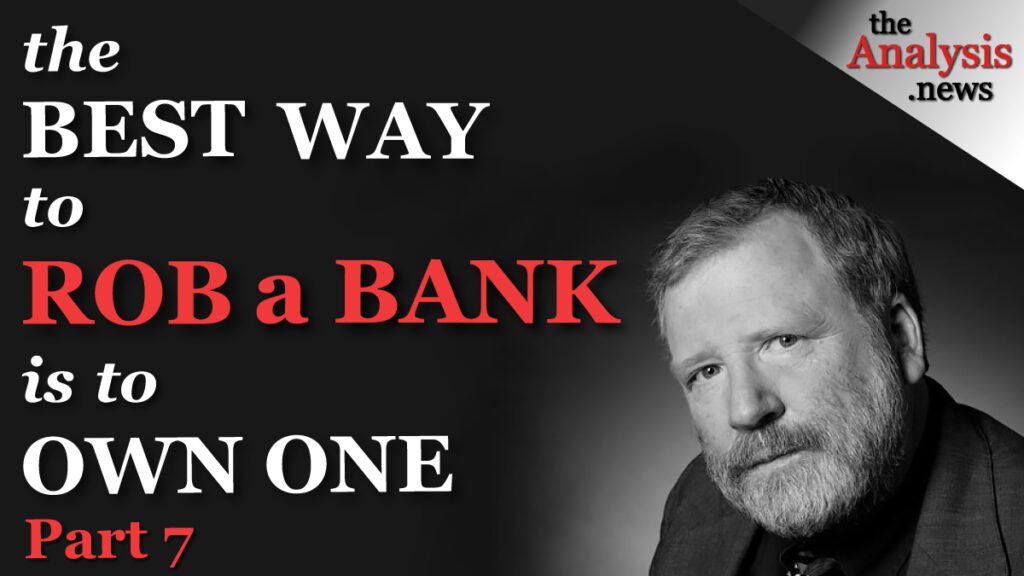
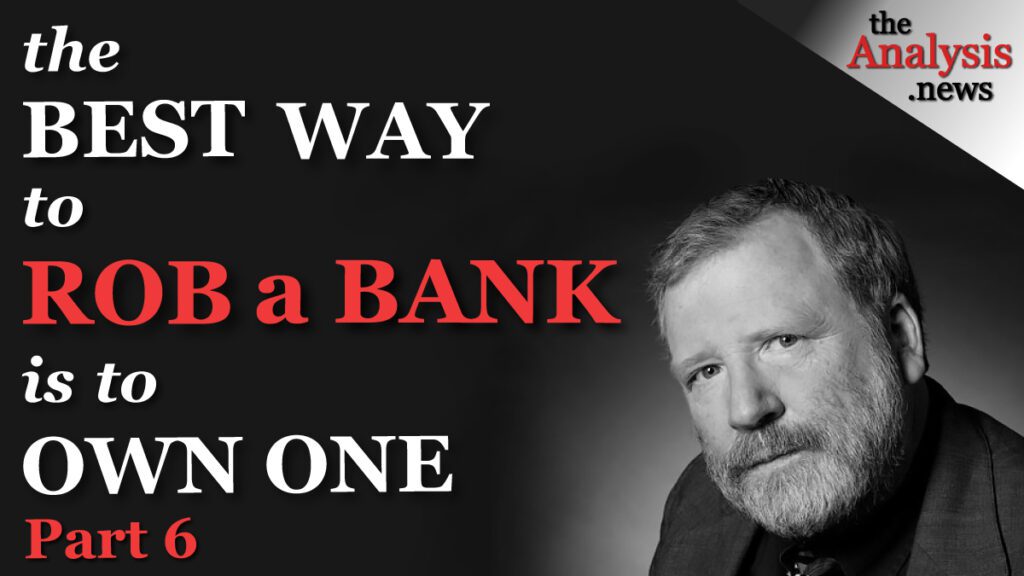
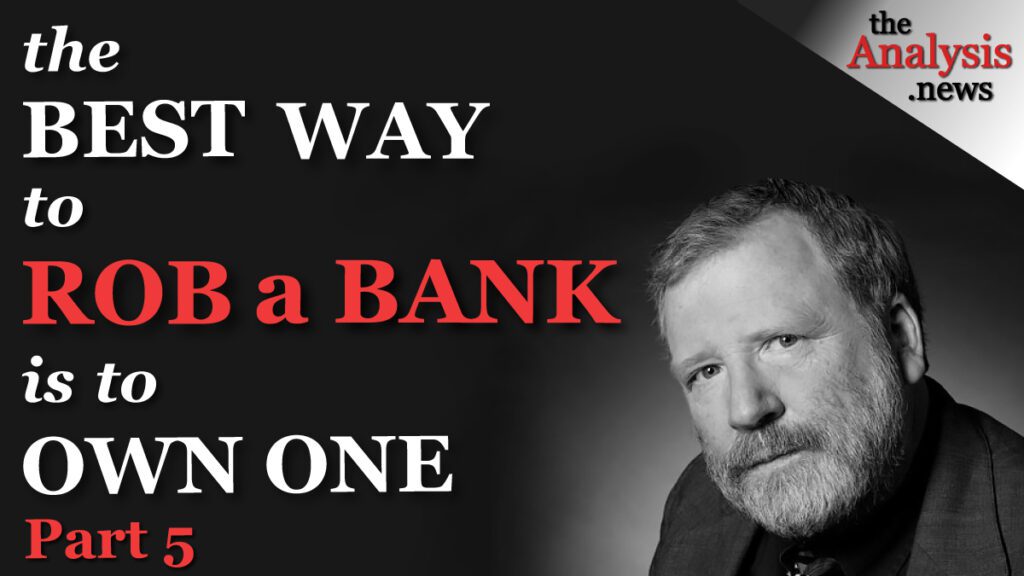
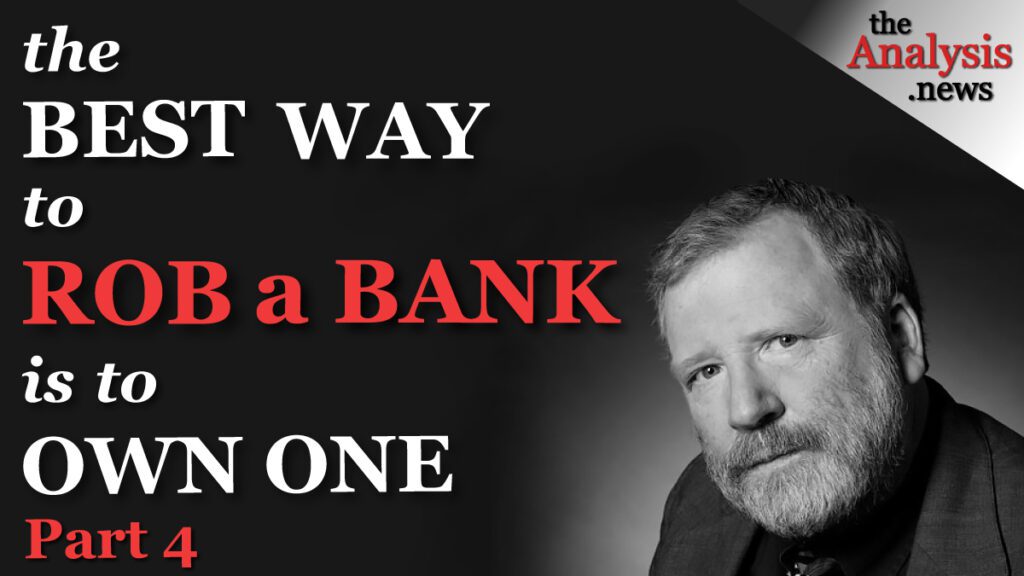
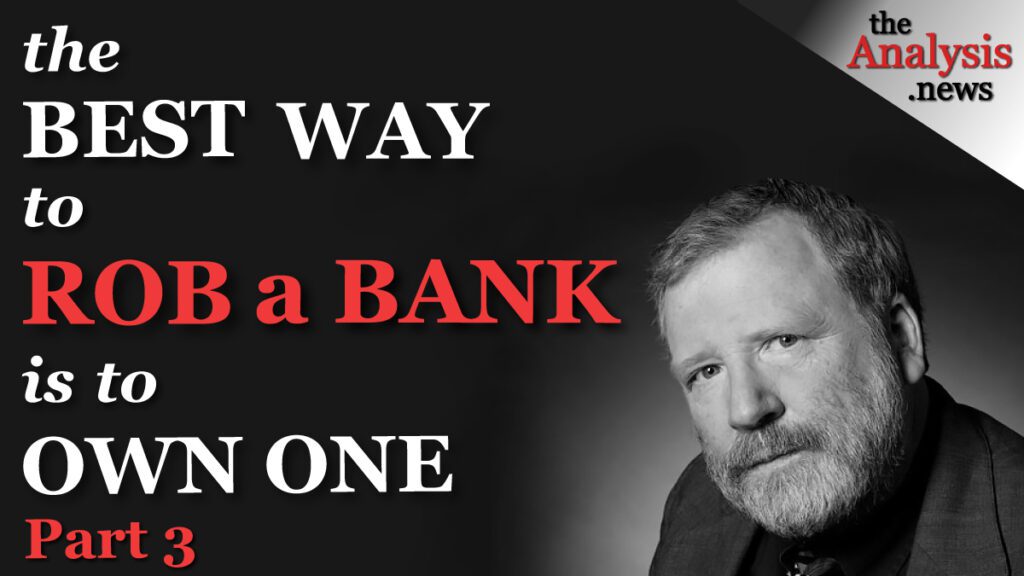
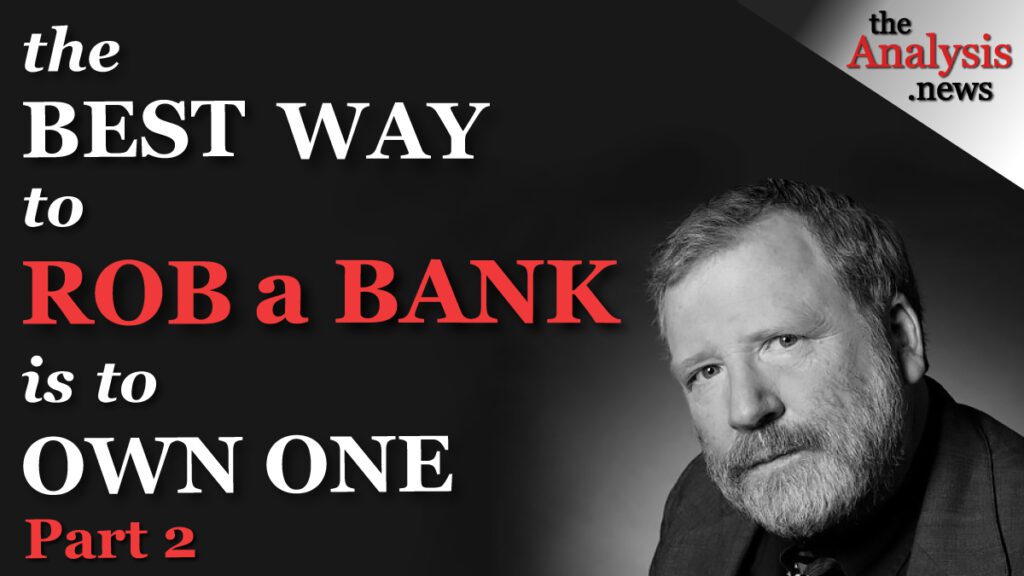
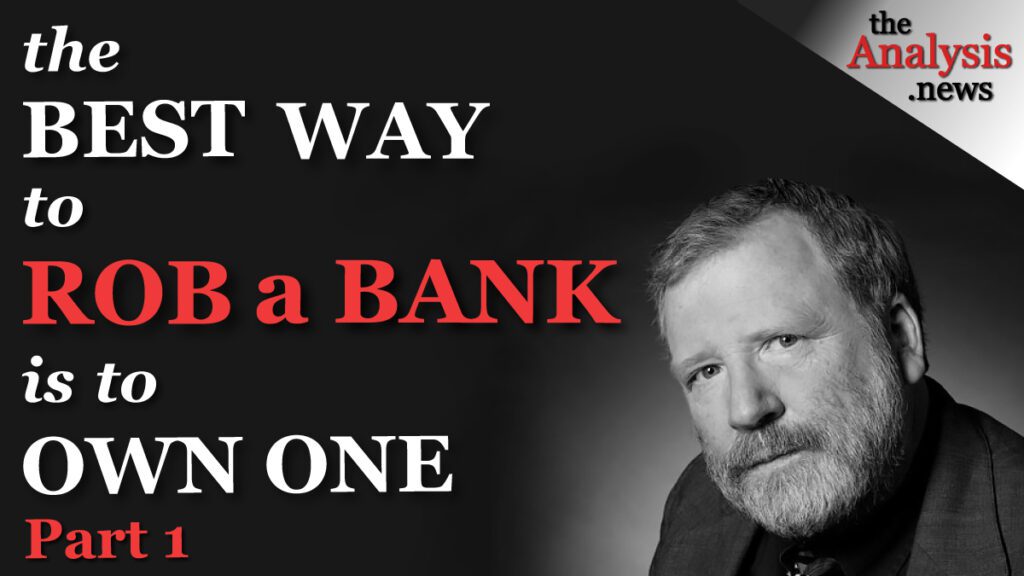
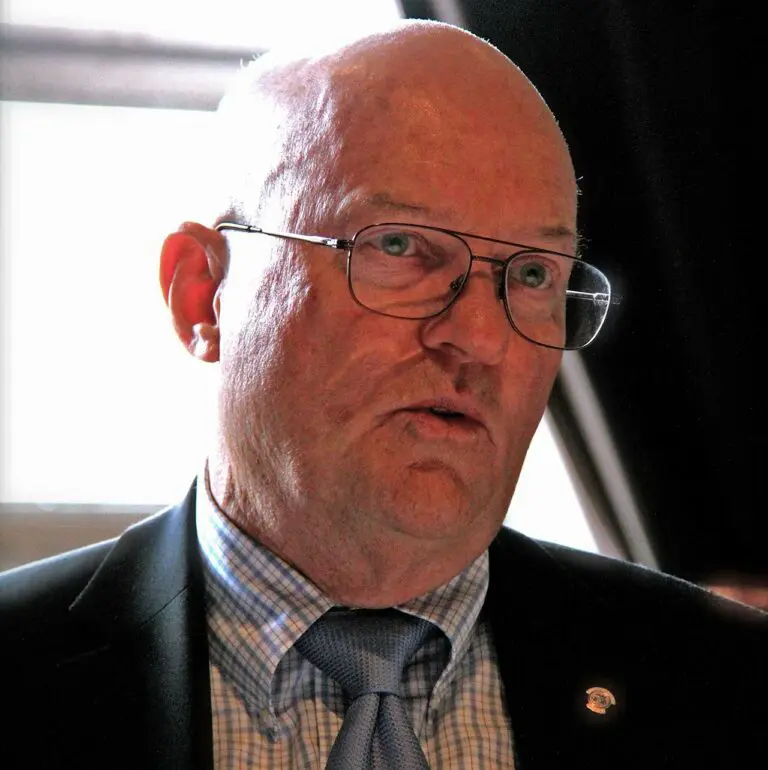

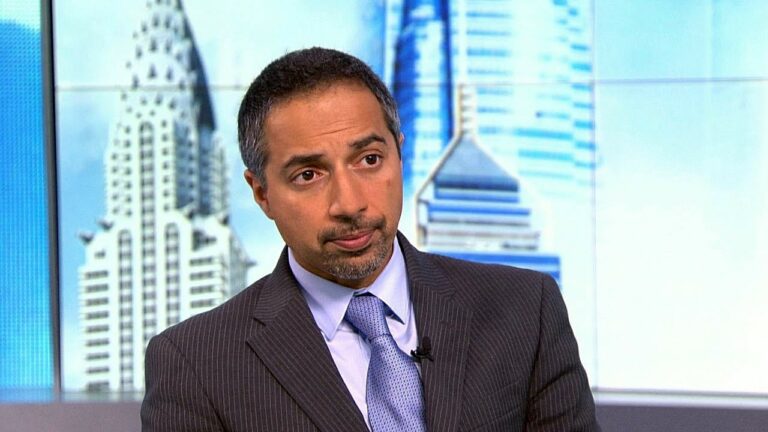
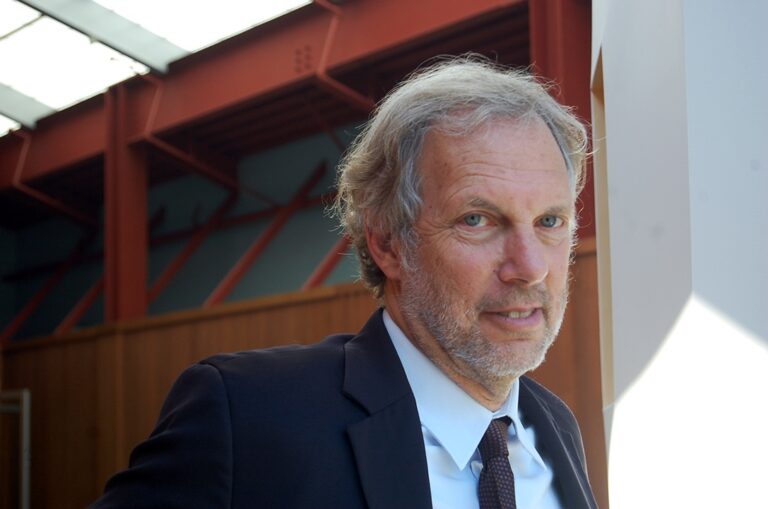
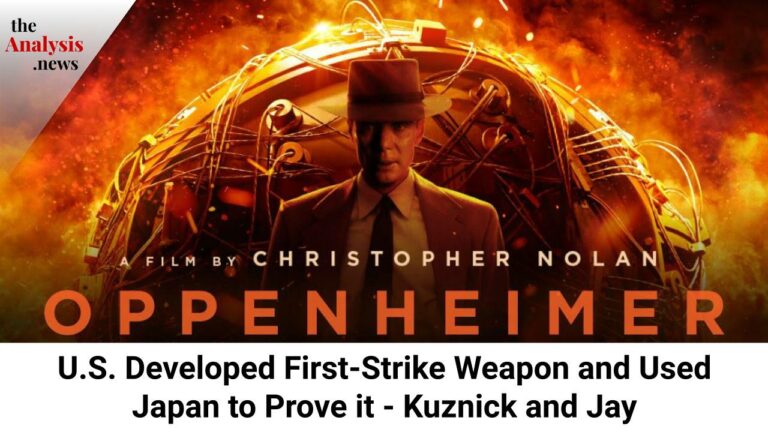

Americans Against Foreclosures ( AAF ) wants to take this opportunity to thank you for all you do. http://www.axj.nu
Thanks for this very worthwhile series.
whoops, see you are using Vimeo already. If you have not, then you might look at other platforms like RokFin too as they can provide income and exposure.
might want to port your videos to sites besides Google YouTube, as they become more authoritarian and anti-democratic.